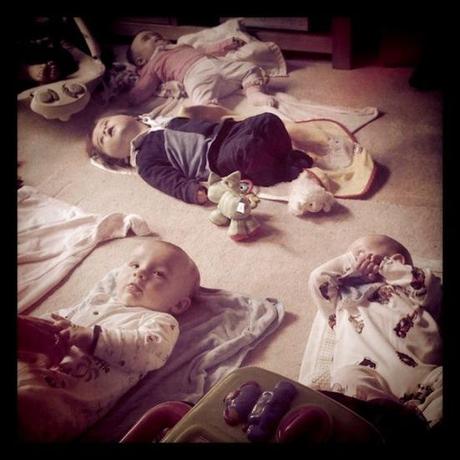
Ben started nursery today.
I am so happy. It means that he can get on with his socialization, plus I get to stroll through one of the loveliest, most verdant parts of the Chiltern Hills en route each time.
That statement is a significant one. No, not the Chiltern Hills bit – although that’s a bonus – but the socialization bit. I recognize it as a key part of Ben’s development and do worry about it.
Not that being part of a deaf bilingual household would stunt Ben, exactly; it’s more that he needs to be socializing with other hearing children, by way of familiarization of the mainstream as a backdrop to the family environment he will grow up in.
I am not the only one. A London deaf mom emailed me and other deaf mums for advice regarding nursery places. She was worried that the long waiting list for the nursery in her area might affect her daughter’s socialization, and asked if she should write to the nursery about her concerns.
She was right, of course. This was not a request for a child of deaf parents to get favourable treatment, exactly. The key issue was access. Although the social environment the girl was mingling in made for potentially empathetic friendships with other children of deaf parents as part of a healthy and close-knit deaf community, she still needed to be regularly exposed to a mainstream social environment in order to thrive there too.
We all want our children to grow up as well-rounded individuals, and this mom was no different. But where my family and I are concerned, particularly, there is a double barrier – first mine or Miles’, then Isobel’s – which can have implications for Ben, ironically, even though he is not deaf or disabled.
For a start, I knew that getting Isobel into mainstream nursery would take an almost-eternity. It wasn’t just a matter of winning a place, although local nurseries are heavily over-subscribed as I’ve already mentioned before. Staff needed an established SEN statement from the local authority (LA) before they could start preparing for Isobel’s arrival.
And on order for them to get that statement, I had to correspond by email and in person with a bewildering array of educational professionals including a psychologist, an inclusion officer, an education officer, a member of a local specialist educational service that advised mainstream educational settings on individual SEN, and a representative of the LA-funded special school originally proposed for Isobel.
The whole process took months and could be quite protracted – inconveniently so, given that Ben was a newborn at the time. Each time the LA released a proposed statement, I had strictly 15 days to respond – beyond which I risked going to tribunal – and many times when the occasion called for me to be quick off the mark, all I really wanted to do was breastfeed Ben. I never thought juggling my then-overwhelming maternal instincts with my assertive skills could be this difficult.
But juggle it I did, and in the end we got what we wanted. (Once Isobel passes her third birthday, it has been established that the LA will fund her for nine hours a week at PACE, and six in the mainstream nursery.)
Once we’d secured places for both children in that nursery, however, my next immediate concern was for Ben to start as soon as possible. I didn’t want the staff preparations for Isobel’s attendance to delay his - even though I knew that for a time, I would be in the strange position of dropping him off and then returning home to continue looking after his big sister, instead of going to work as you do (usually). So to see him taking to nursery like the proverbial duck to water today was incredibly satisfying, particularly with so much to play with at his disposal.
Whilst I have overcome one potential barrier in a sense, though, I still haven’t resolved the issue of Isobel’s socialization. To be honest – although it is still a comparative strength, thanks largely to her adorable personality – I have already accepted that it has probably already been affected by the dearth of inclusive children’s activities generally, due to either geographic location, frequency, available funds, or all three. It is an enormous shame; given Isobel’s access requirements her socialization should really be made a priority over her brother’s.
But I refuse to blame the nursery. The staff have been brilliant. In the past week Isobel’s designated one-to-one assistant has visited her at PACE twice, and plans to go again on Wednesday. All discussions I have had with the SENCO and nursery manager, too, have given me clear reassurance that they will do everything they can to ensure her inclusion in the setting. They even agree that she and Ben should spend time together in the nursery whenever possible.
Really, it is the system that they are having to work with: the same horrific, bureaucratic system that created the statementing process in the first place, and is now making them spend months in training, before Isobel can be part of their environment. Despite my and Miles’ wishes – and those of the nursery themselves – it seems that in practice, inclusion in education will always be an afterthought.
Related articles:
- News just in (themostynthomasjournal.com)
- Isobel’s SEN statement: an update (themostynthomasjournal.com)
- New term, new beginnings (themostynthomasjournal.com)

